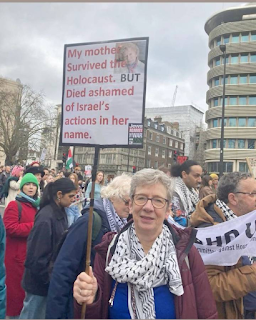Loretta Ross - Calling In - WOW!
Still, forgiveness, when given freely, can be
powerful. … As Chris Singleton, whose mother was murdered
by white supremacist Dylann Roof attested, “I’ve realized that forgiving is so
much tougher than holding a grudge…It takes a lot more courage to forgive than
it does to say, ‘ I’m going to be upset about whatever forever.’” Forgiveness permitted Singleton to keep his
power, to bestow grace upon someone who’d hurt him tremendously.
Forgiveness is something you do for yourself before you
can forgive others. Forgive yourself for
when you knew you should’ve spoken up, but you were scared. p.222
And so I’d like to more fully describe the steps that Ama
Saran taught me: (1) acknowledge the harm, (2) apologize, (3) make amends, and
(4) plan to prevent future harm. p.223
https://www.macfound.org/fellows/class-of-2022/loretta-j-ross
This is an incredible book, written by a most wonderful individual
who I greatly admire! There are few
books that I think are “must reads” for nearly all “caring people”. This
is clearly one of them!
Together, over time, we can transform our culture that
excludes and impugns people into a culture that invites people in. p.6
From the beginning of this book Loretta Ross writes
succinctly and to the point. She uses
humor, personal stories, including sharing mistakes she has made, to welcome
each of us as we take in slivers of her incredible wisdom.
I laughed and cried and loved and love so much in the book. In other spaces I try to apply much that I
have learned from this wonderful Black Woman.
She shares so much with us!
https://www.macfound.org/fellows/class-of-2022/loretta-j-ross
The Macarthur Foundation’s website link
is above. They honored Ross in 2022,
particularly for her work related to reproductive justice and other justice
issues.
Hearing and watching
Loretta Ross in San Francisco was Incredible!
Even for me, calling in isn’t always easy. Even after I’d put in decades of work as an activist, even after years of promoting the virtues of an empathetic human rights framework, I still could mess it all up in an instant. I still do. p.141
Ross speaks of the importance of calling ourselves in, and looking at our own deep hurts before we try to practice calling in, in our work and practice with others. When we transfer our own s**t – our anger or fears – onto others, it is significantly because we’ve not started healing ourselves. Wow!
There’s a power, a muscularity to calling in. It requires emotional intelligence, the
courage to overcome your fears, and an investment in another’s growth without
proof of return. The goal is not to assume
the magical power to fix other people.
It’s to try to become your best self by offering love, respect, and
compassion to those with whom you disagree.
As difficult as it is, we can learn how to offer compassion for who violate
human rights. It’s entirely too easy to
look down on them, to think “I know the truth, and they don’t,” and to use our
certitude to disregard their humanity.
Calling in can allow us to heal – showing us how strong we can become –
even as we offer others an outlet for their healing. It can allow us to be vulnerable and
confident at the same time. But that’s
only if we are in the right place. p.152
This book is much better than any quotes I can share! Loretta Ross’s workshops on Calling In are
also well worth participating in on zoom!





Comments
Post a Comment